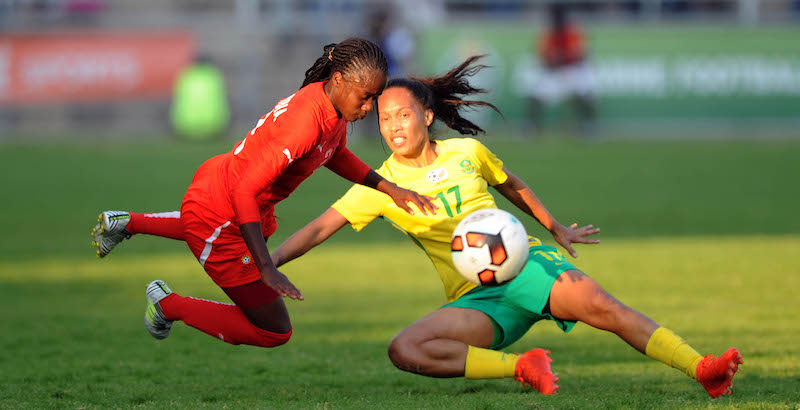
Team-by-team guide to the COSAFA Women’s Championships
The 2018 COSAFA Women’s Championship will be staged in South Africa’s Nelson Mandela Bay from September 12-22 with what is arguably the most exciting line-up of sides ever to grace the competition.
The draw for the competition will be staged on Wednesday when the teams will learn their fate in the first round.
Here is a team-by-team guide to the 12 teams that will take part in what is the best regional competition for women on the African continent.
BOTSWANA
Botswana will be seeking to make the knockout stages of the COSAFA Women’s Championship for the first time when they compete in South Africa this year.
The Lady Zebras had in fact yet to win a game having featured at the inaugural finals in 2002, and then again in 2008 and 2011, but last year broke their duck with a 3-0 success over Lesotho.
They also managed draw against eventual champions South Africa, but it was not enough to advance from their pool as they finished second.
There is no doubt that their performances have improved since those early years.
Their very first match in the regional showpiece competition in 2002 ended in a 14-0 loss to South Africa, but by the time they competed in the last finals in 2017, their clashes were all much closer.
That opening defeat was in fact the very first fixture of the national team, who are now celebrating 16 years of playing at international level.
The country has not yet qualified for a major championship, having entered the preliminaries for the last two FIFA Women’s World Cup finals, and for the African Women’s Championship since 2008.
CAMEROON
African powerhouse Cameroon will make their first appearance at the COSAFA Women’s Championship after being invited to add some extra-spice to an already strong field.
The side are rated as the third best in Africa as per the FIFA Women’s World Rankings, behind only Nigeria and Ghana, and will be the top side in the field according to that list.
They represented the continent at the 2015 FIFA Women’s World Cup in Canada, and did so with aplomb, reaching the second round.
After pool stage victories over Ecuador (6-0) and Switzerland (2-1), they narrowly lost -0 in the knockout stages to China.
Cameroon also have a strong record in the African Women’s Championship, even if they are yet to taste gold.
Their previous 11 appearances have yielded 10 trips to the knockout stages, with four silver medals and two bronzes.
They have qualified again for the finals in 2018 and will use this competition as a build-up to that event in Ghana.
LESOTHO
Lesotho have been regular competitors at the COSAFA Women’s Championships since the first tournament played in 2002.
They did not get off to the best of starts with a 15-0 defeat in their opener to hosts Zimbabwe, which remains the heaviest defeat in the history of the competition.
But performances have steadily improved since then, and they were close to semifinal qualification in 2011 when they beat Mozambique 3-2, but lost to Malawi in their play-off decider.
Last year they claimed a fine 2-1 win over Namibia in pool play, but lost to South Africa and Botswana.
The national team is currently positioned at number 137 in the FIFA Women’s World Rankings.
They played their first international in 1998 away in Mozambique and lost 3-0.
MADAGASCAR
Madagascar will feature at the COSAFA Women’s Championships for the second time having missed the first four instalments of the regional showpiece competition with the country only recently having played their first official international.
Their first official FIFA-sanctioned match was a 3-1 loss to Botswana in the qualifiers for the African Women’s Championships in 2015, though other selections did play matches before that.
The team have steadily improved since then and finished runners-up at the 2015 Indian Ocean Games, losing in the decider to Reunion.
Last year they had a tough introduction to the COSAFA Women’s Championship, losing all three of their matches to Zimbabwe (0-4), Malawi (3-6) and Zambia (1-7).
MALAWI
Malawi played their first ever international at the 2002 COSAFA Women’s Championships, but were on the receiving end of an 8-0 loss to hosts Zambia at that tournament.
They beat Lesotho 3-0 in their next game to record a first win, but failed to reach the knockout stages. They defeated Lesotho by the same scoreline at the 2006 COSAFA Women’s Championships, but a 3-0 loss to South Africa ended their semifinal hopes.
Malawi did reach the knockout stages when the tournament was played in 2011, finishing second in their pool, but came unstuck against the South Africans again with a 5-1 semifinal loss.
They eventually finished fourth after losing 3-0 to East African guest nation Tanzania in the bronze medal play-off match.
The side had a mixed competition in 2017, losing to Zambia (3-6), drawing with Zimbabwe (3-3) and claiming a handsome win over Madagascar (6-3) to finish third in the pool with four points.
MOZAMBIQUE
Mozambique appeared at the very first COSAFA Women’s Championships in 2002 and excelled, reaching the semifinals before they were handed an 11-1 defeat by hosts Zimbabwe in the knockout match.
They have not managed to match that feat since, but can look back with pride on victories over Swaziland (2-0) and Botswana (7-1) in those inaugural championships.
They also competed in the regional showpiece finals in 2011, but managed just a single point in the pool stages.
They had mixed success in 2017, losing to East African guest nation Kenya (2-5), drawing with Swaziland (2-2) and beating Mauritius (3-0).
They have twice before entered the qualifiers for the African Women’s Championships, but failed to reach the 2006 and 2012 continental finals.
Their first ever international was a 3-0 win over Lesotho in 1998, with their biggest victory a 9-0 defeat of Namibia in 2006.
NAMIBIA
Namibia have three previous appearances at the COSAFA Women’s Championships when they turned out in 2006, 2008 and 2017, and have largely excelled in the regional showpiece competition.
The Brave Gladiators have always been tough competitors in the past and the same will be expected when they feature in South Africa in 2018.
In their first showing in 2006 they claimed an excellent 2-2 draw with Zambia and then thumped Swaziland 6-0 in the pool stages, enough to see them into the semifinals as runners-up in their group.
They gained revenge over Zambia with a 5-4 penalty shoot-out victory after a 1-1 draw, but lost in the final to South Africa when they went down 3-1.
They reached the semifinals again two years later, but this time were ousted at that stage by South Africa, ironically by the same scoreline.
They had less success in 2017, beating Botswana 4-0 in their opener, but then losing 2-1 to Lesotho and once again suffering a 3-1 loss to South Africa to finish bottom of their pool.
SOUTH AFRICA
South Africa are four-time winners of the COSAFA Women’s Championship and will be the defending champions after claiming the title again last year when the competition was staged in Bulawayo, Zimbabwe.
They stormed to the 2002 title, beating Zimbabwe 2-1 in the final as they won all five of their games, scoring 36 goals in the process.
That included huge victories over Botswana (14-0) and Mozambique (13-0) in the pool stages.
It was more of the same in 2006 as they won both group stages games against Lesotho (9-0) and Malawi (3-0), before a 4-1 victory over Zimbabwe in the semifinals. They beat Namibia 3-1 in the final to pick up gold.
A clash of fixtures meant they sent an Under-20 side to the 2008 championships, but still won all of their games, including a 3-1 victory over hosts Angola in the final.
But their run was ended by Zimbabwe in the decider in 2011, leaving them with a record of 18 wins from 19 games in the COSAFA Women’s Championships.
They regained their title in 2017 though as wins over Lesotho (3-0) and Namibia (3-1) saw them into the knockout stages, where they came from 3-0 down with 13 minutes remaining to draw 3-3 with Zambia and win on penalties.
That set up a final with Zimbabwe, where South Africa ran out 2-1 winners to regain the trophy.
They will be among the heavy favourites to regain the trophy again in 2018.
SWAZILAND
Swaziland featured in the early days of the COSAFA Women’s Championships but were not present in Zimbabwe in 2011, making a return to the regional showpiece event last year.
They claimed a 3-0 win over Botswana in their second match in 2002, and had to wait another 15 years for a second victory, and they are now seeking a first ever place in the knockout stages at the competition.
They claimed a 3-0 success over Mauritius in their first pool match in 2017, following that up with a 2-2 draw with Mozambique and a 1-0 loss to eventual pool winners Kenya to finish second in the group.
The side has not been able to enter a team for the qualifiers for the Women’s World Cup and African Women’s Championships since the late 1990s, and have been largely inactive over the last few years.
UGANDA
Uganda will bring some East African flair to the COSAFA Women’s Championship and follow Kenya, who finished fourth in 2017.
They played their first international in 1998, a 1-1 draw with Egypt, and the team has grown steadily since.
Their only previous appearance at the African Women’s Championship came in 2000 when the competition was hosted in South Africa.
They were unlucky not to make the knockout stages after a draw with Zimbabwe (2-2) and victory over Reunion (2-1) saw them lose out on a place in the semifinals on goal-difference to Zimbabwe.
The side is currently rated number 131 according to the FIFA Women’s World Rankings, but last year they reached a record number 111, which shows their growing prowess.
ZAMBIA
Zambia have enjoyed a recent return to form having qualified for the 2014 and 2018 African Women’s Championships and will want to continue that upward curve at this year’s COSAFA Women’s Championships.
The Shepolopolo have three times before been bronze medallists in the regional showpiece competition, including last year, but have yet to lift the coveted trophy and that will be a genuine aim of theirs in 2018.
They played in the inaugural competition in 2002 when wins over Malawi (8-0) and Lesotho (3-1) saw them into the semifinals, where they lost 3-1 to South Africa. They beat Mozambique 1-0 to take the bronze medal.
The side topped their pool in 2006 as they drew 2-2 with Namibia and beat Swaziland 7-0, but this time were edged in a penalty shoot-out by the Namibians after a 1-1 draw. They beat old foes Zimbabwe 2-1 to take the bronze again.
The side could not replicate that in 2008 and in 2011 were surprisingly ousted in the pool stages.
They did reach the semifinals in 2017, topping a pool that also includes Malawi (6-3), Zimbabwe (1-1) and Madagascar (7-1), but let a 3-0 leading slip against South Africa in the final 13 minutes to lose on penalties.
They then beat East African guest nation Kenya via spot-kicks after a 1-1 draw to seal the bronze medal.
ZIMBABWE
Women’s football in Zimbabwe has seen a resurgence in recent years after the side won the Southern African championship in 2011 and also qualified for the Olympic Games football tournament in Brazil in 2016.
Zimbabwe, who were runners-up in 2017 on home soil, have always been a competitive side and finally broke their duck in the competition with victory in 2011.
They reached the final in the inaugural competition in 2002, but lost to South Africa 2-1 in the decider in Harare.
They had stormed into the final with four straight wins in which they scored a staggering 36 goals, including a competition record 15-0 victory over Lesotho in their opener.
They finished top of their pool again in 2006 after two matches against their only pool opponent, Angola, but came unstuck in the semifinals this time with a 4-1 loss to South Africa. They were beaten to third place by Zambia when they went down 2-1 in the bronze medal match.
The 2008 championship in Angola provided little joy, but they finally lifted the trophy in 2011 on home soil when they proved a dominant force again and beat South Africa 1-0 in the final.
They could not quite repeat that feat in Bulawayo in 2017 as they took the best runner-up spot in their pool with victory over Madagascar (4-0), and draws with Zambia (1-1) and Malawi (3-3), before walloping East African guest nation Kenya 4-0 in the semifinals.
That set up a final against old foes South Africa, but Zimbabwe finished on the losing side by a 2-1 scoreline.
Zimbabwe’s best finish at the African Women’s Championships was fourth in 2000.


